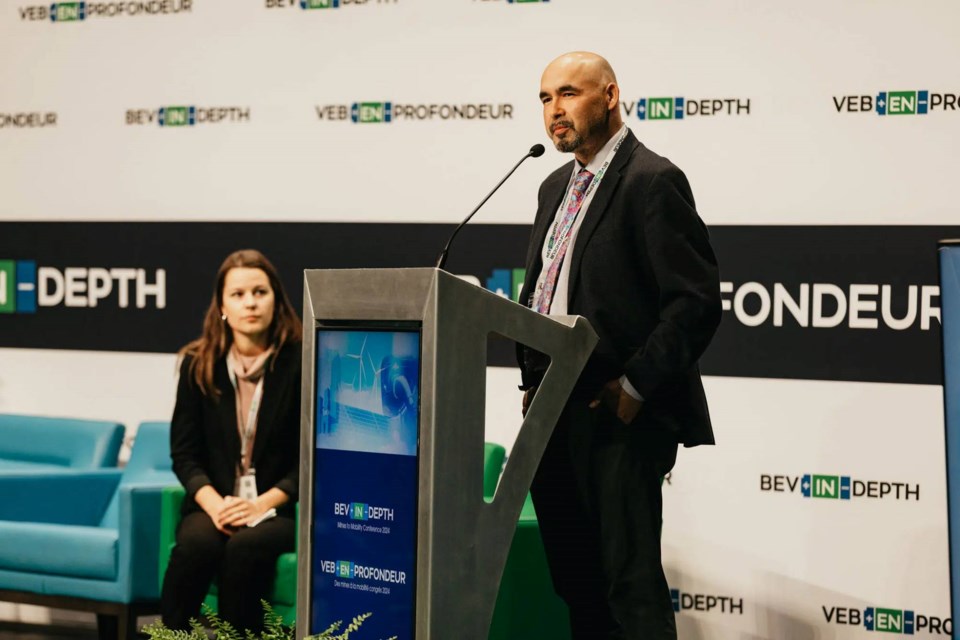Two years ago, Craig Nootchtai recalled, he was feeling "cautiously optimistic” about his community's increasing involvement in the area's resource projects.
The chief of Atikameksheng Anishnawbek, whose territory includes the City of Greater Sudbury, was reflecting on a previous experience at the BEV In Depth: Mines to Mobility conference, an annual, two-day event of activities focused on the battery-electric manufacturing supply chain.
But during this year's event, held May 29-30 at Cambrian College, Nootchtai retracted his earlier comments.
Fresh off the announcement that Wyloo would build Canada's first battery metals processing plant in Sudbury, Nootchtai said he was upgrading his view to “very optimistic.”
That's because the announcement was accompanied by the signing of a memorandum of understanding (MOU) by Wyloo, Atikameksheng, Whanapitae First Nation and the City of Greater Sudbury, indicating a desire for equal partnership by all signatories in the development of the project as it moves forward.
“I think in our entire history in Atikameksheng Anishnawbek, this is the first time we've been approached by industry, or a municipality, to come sit with us and to engage us right from the very onset for a large project like this,” Nootchtai said May 30 to conference attendees.
“And so it's a very monumental day for us.”
The spirit of the MOU aims to ensure that the processing plant, which is valued at between $800 million and $900 million and will require several hundred workers, will create benefits for everyone living in the area for generations to come, Nootchtai said.
The chief credited the outcome to "good leadership, making good decisions” that include all stakeholders in the discussions.
And he's excited, he said, about working not only on this project, but on others in the area as they emerge.
Immediately after the news was made public, Nootchtai said, he began fielding phone calls of congratulations and support from various parties eager to help the community in the endeavour — an important piece of economic reconciliation for his community.
“We're struggling,” he said. “We're a First Nation, we rely heavily on government funding, and we're trying to do everything we can to get out from under the government.
“We need to build our own economy. And it's through partnerships like this that we can do that.”
Nootchtai made clear his community is in support of these types of resource projects, but equally important to Atikameksheng is the ability to have a say in what takes place in their territory, and safeguarding the land for future generations.
He's looking forward to building capacity in the community, so they can participate in all aspects and at all phases of the project.
With close to 1,700 members, Atikameksheng is a small but growing community whose members are looking for opportunities to return home.
Nootchtai expects the Wyloo project will enable more educational and training initiatives to open up to members, which will have immeasurable benefits for the community.
“It's going to bring more opportunities for education,” said Nootchtai, a 2021 graduate of Cambrian College's civil engineering technology program.
“We're going to be pushing hard with our members to look at opportunities in this industry so that they have that stability; they can have long-term employment.”
The chief is hopeful that new infrastructure, especially new homes, will follow, along with spinoff economic opportunities.
Mindful of any risks and challenges that might arise, Nootchtai emphasized the need for communication, engagement, and transparency as the Wyloo project moves forward.
But overall, he said, Atikameksheng is excited to participate as a leader in bringing sustainable development to the region.
“We know, as good neighbours … any type of minerals or any type of resource development in our lands, we want to share that and be part of that as true partners,” Nootchtai said.
“And so that's what our definition of sustainability is, is when we're able to develop projects like this and we're all benefitting for generations to come and it's not a one-sided benefit."
